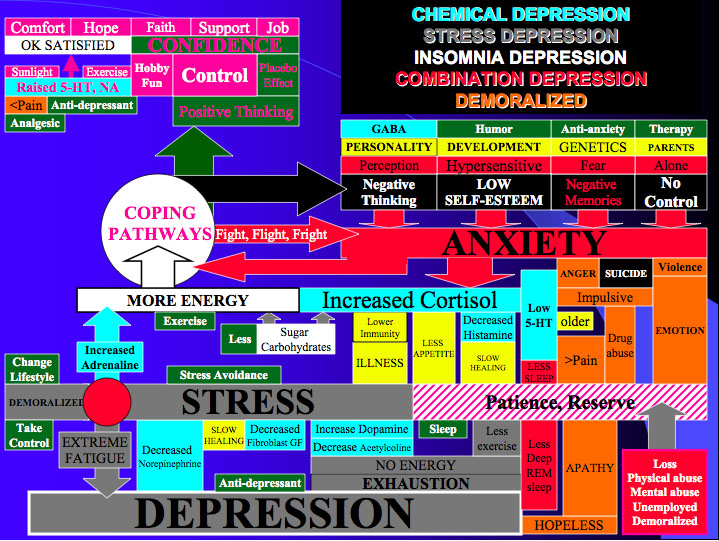Differences Between SSRIs and SNRIs

Depression has very complex connections in the brain
SSRIs vs SNRIs
Introduction:
Selective serotonin reuptake inhibitors (SSRIs) and Serotonin-norepinephrine reuptake inhibitors (SNRIs) both are a class of antidepressants. These medicines are very commonly used to treat depression and anxiety disorders. The mechanism of action of these two medicines is similar but there is a vast difference between the two. Both these medicines take from a few days to a few weeks to produce the desired effect.
Difference in action:
Selective serotonin reuptake inhibitors (SSRIs), as the name suggests, inhibit the reuptake or re-absorption of the brain chemical serotonin by the nerve cells. Serotonin is a neurotransmitter associated with the sense of well-being and joy. When the re-absorption of this chemical is blocked, the amount available to the brain increases. SSRIs are most commonly used in the treatment of moderate to severe depression. They are also used in anxiety disorders, panic disorder, obsessive compulsive disorder (OCD), and in post traumatic stress disorder (PTSD). This medicine has helped in allaying depression and anxiety in majority of the patients with lesser side effects as compared to the older drugs.
Serotonin-norepinephrine reuptake inhibitors (SNRIs) also inhibit the reuptake of serotonin. In addition, they inhibit the re-absorption of another neurotransmitter called nor-epinephrine. Just like serotonin is associated with positive feelings, nor-epinephrine is associated with alertness and energy. Thus, this newly found group of medicines also are used in the treatment of major depressive disorders, mood disorders, anxiety disorders, and attention deficit hyperactive disorder (ADHD). Apart from these, SNRIs are also used to treat chronic neuropathic pains like nerve pain from diabetes, fibromyalgia, and in relief of menopausal symptoms.
Difference in side effects:
SSRIs are widely used as anti-depressants but they cause side effects too. Some of these which require immediate attention are suicidal thoughts, agitation, erectile dysfunction (trouble in sustaining an erection), increased risk of bleeding etc. These medicines do not carry the risk of addiction but should never be stopped abruptly without medical advice. However, it has been seen that SSRIs are better tolerated as compared to SNRIs and other anti-depressants.
SNRIs also cause similar side effects of suicidal thoughts, increased risk of bleeding along with weight loss, hives, trouble breathing, sleep problems etc. SNRIs tend to produce more side effects and are less tolerated as compared to SSRIs. They also give rise to withdrawal symptoms like dizziness and insomnia when discontinued abruptly. But, SNRIs are found to produce easier remissions in the symptoms of depression and anxiety. As compared to SSRIs, SNRIs are cost effective.
Summary:
SSRIs and SNRIs are the new, commonly used and very efficacious medicines in the treatment of depression and anxiety disorders. These medicines inhibit the reuptake of the neurotransmitters serotonin and nor-epinephrine to elevate mood and increase energy levels. SNRIs differ from SSRIs in being useful in chronic nerve pains. It has also been seen that though SNRIs are little cheaper than SSRIs while the latter are tolerated better by patients. However, SNRIs work better in terms of the desired effect of controlling symptoms and producing periods of remission. SSRIs and SNRIs do not carry the risk of addiction but should never be stopped without consulting a doctor in order to prevent withdrawal symptoms.
- Difference between near sightedness and far sightedness - January 21, 2015
- Difference between Diverticulosis and Diverticulitis - January 20, 2015
- Difference between Prilosec and Nexium - January 19, 2015

Hi there –
Just a note to say that there are several inaccuracies in this article. Do you have your medical write-ups edited by a medical professional? It might make sense. I’m not trying to be a troll, just concerned about the misinformation pations may be receiving here. SSRIs and SNRIs, for instance, do not *inhibit* seratonin, as stated in the summary; they inhibit the *reuptake* of seratonin (like inhibiting recycling), meaning that they actually make seratonin (and other neurotransmitters) *more* available to the brain, not less.
Just a thought. Thanks for considering.
You obviously did not read the summary very well at all. The author stated it 100% correctly. It is as clear as daylight. Read it again and see how your correction is exactly what the author wrote in the first place. How much clearer can it be???
Hi
For your consideration
If you read the summary in greater detail it actually states that SSRI’s and SNRI’s inhibit the ‘reuptake’ of both the serotonin and nor-epinephrine not as mentioned in your comment
So all is as it should be..
I just started an SSRI, brand Lexapro. My SNRI brand name Effexor was doing nothing for me, I tapered off. Now, within 2 weeks of taking Lexapro, feel my anxiety and depression are lessening. I’m kind of confused why an SNRI would not help my symptoms, in fact made them worse, while an SSRI is working. It seems to me I should have been getting the same, plus additional, relief from an SNRI. I’d love some anectodal feedback from people who may have had a similar experience. I understand the science behind these medications continue to be a bit obscure.
Unfortunately, there have not been enough studies on SNRIs. And Big Pharma has lied about the SNRIs across the board in order to get as many medications on the market as quickly as possible. Not to mention, they own the company that performs the drug trials and are only required to hand pick the patient reports they wish to turn over to the FDA. Big Pharm has been lieing for years. Their only concern is the money.